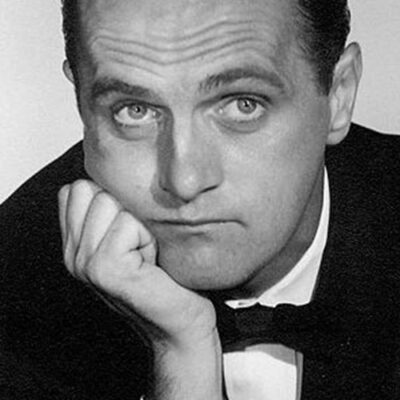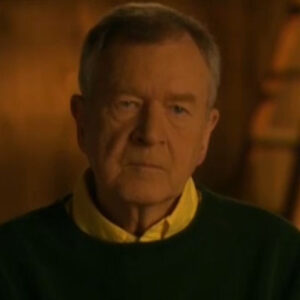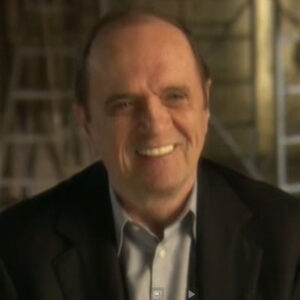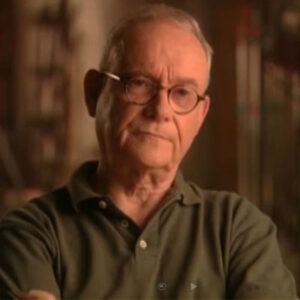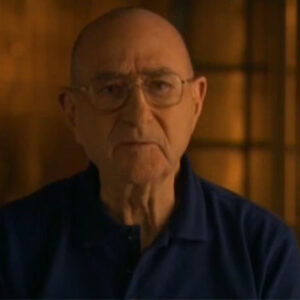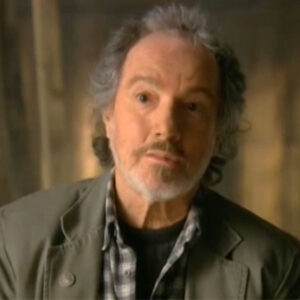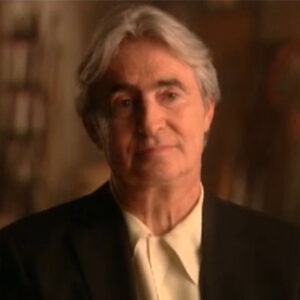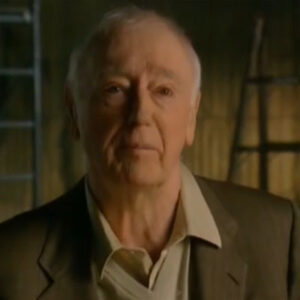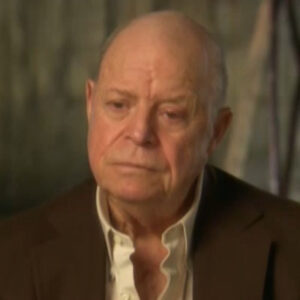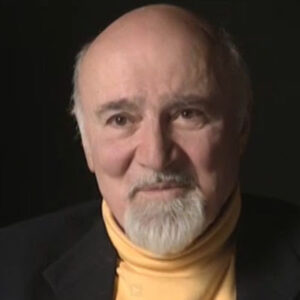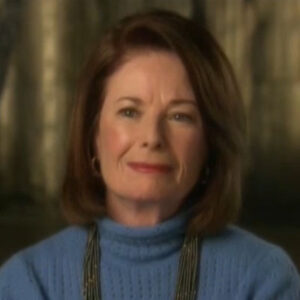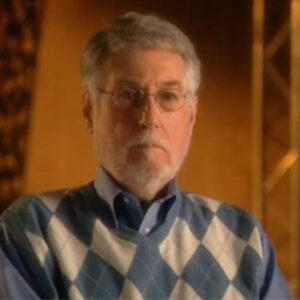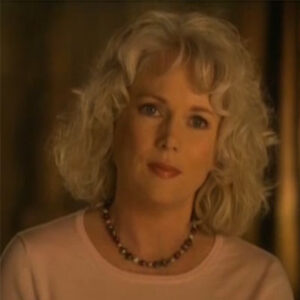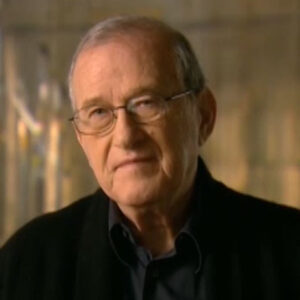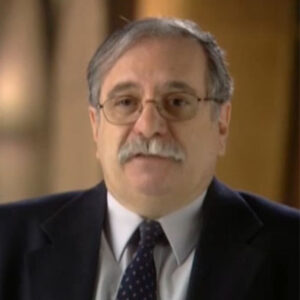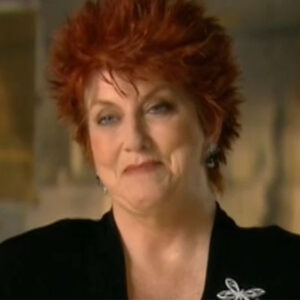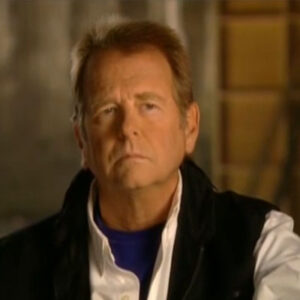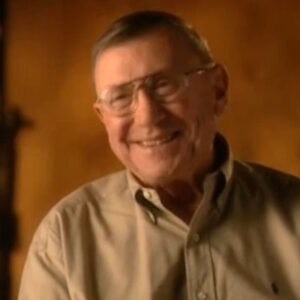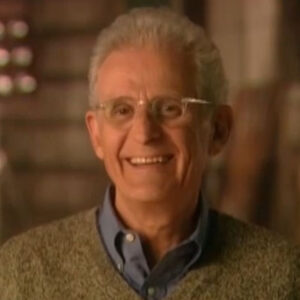Interviewer: Start maybe talking a little bit about some of your early comedic influences. And I know one of the people that you’ve cited as a big influence for you was Jack Benny. And I was wonder if you could talk about him and how he influenced you.
Bob Newhart: Well, Jack was a. I think some people compare my timing with Jackson. I’m not sure that you can teach somebody timing. It’s something you hear in your head. I Jacqui’s an influence man because he was he was the bravest comedian that I’ve ever seen. He wasn’t afraid of silence. He wasn’t afraid of how long it took to get to the punch line because he knew the punch line would. Would pay off. And Dick Martin told me story. He was there. Jack was appearing in Vegas, I think. Well, Mastin Trio with Sammy Davis. Was opening for Jack. So they finish and of course, wild applause. And they walked off and Jack walked on. He started talking, said, you know, the afternoon I, I come to I used to order some tea and. And then I then I walked through the casino and I walked through the casino and I ran into an actor I had worked with and, um, and his name was. He said, what? Oh, what was his name? He said, I’m sorry. I’m so I promised Sammy he could do another song. So would you like Sammy to do it? So the warnings went crazy and Sammy came on the birth of the blues and of course, tore the house down and Jack watched him go off in that inimitable way of his. And he said, Nigel. That was his name, Nigel. No. I mean, no comedians in the world would ever put himself in that position. But Jack was so. He was so good.
Interviewer: Did you find that with your own style that you like to have?
Bob Newhart: Well. No, I insist that you have to take the time it takes to tell it, and there’s a clock inside your head that tells you how much time to take.
Interviewer: And you just feel it.
Bob Newhart: They just you know, you just feel it. At. The famous story, of course, by Jack was maybe one of the biggest laughs in radio ever was, was when he’s he’s walking to the park and a guy jumps out of the bushes and he says, Or your money or your life. And there’s this long pause. And suppose longer the audience starts laughing more and more and more. And they must have two minutes that it went on and. And the mugger repeats that I said, you’re your money or your life. And Jack’s reply was. I’m thinking, I’m thinking. So that was the influence Jack had of me.
Interviewer: Didn’t he wasn’t there at the time when he came to see you.
Bob Newhart: He told me one time his favorite routine and mine was was the Abe Lincoln routine. The precedent for Abe Lincoln. And he told me, he said if we ever run into each other at a club and I’m in the audience, he said, drop whatever you’re doing. Finish whatever you’re doing. And then do the Abe Lincoln routine. And so it happened at the Palmer House in Chicago that Jack was in the audience because he was going to open the next day, it was closing night for me. Next day was opening for Jack. And until I finished, whatever I was doing and I immediately did the Abe Lincoln routine. And Jack came backstage afterwards. He said. He said, thank you very much. I said, Jack. My pleasure. And he said, But you left out this and you left out that. And you left. And he was right. Over the years, I had I had truncated the routine down. He knew he knows what he wants. He once asked me, said, did you ever hear of a comedian called Frank say? And I say, I’ve heard the name. He said, Did you ever see him work? And I said, no, I don’t think so. And he said, well, you work very much like him and. And then, of course, once he told me that, then I started finding out what I could about Frank Fay, who turned out he was a marvelous monologist, buddy. He was a terrible human being. It’s awful. He married to Barbara Stanwyck. One point. He had a career kind of in movies, but. I had never seen him work.
Interviewer: Not someone you wanted to model yourself?
Bob Newhart: Not not in real life. No, no.
Interviewer: And what about also. I think you’ve mentioned Laurel and Hardy were also an influence.
Interviewer: Well, I would say anybody who was good was an influence. Any comedian I watched on The Sullivan Show, were it long before I ever thought I would wind up doing this for a living. I would watch them and say, oh, why did that work? Oh, oh, because they did it. So I was always I was I was influenced by every every good can be nice. I was influenced by Laurel and Hardy. And I think time. And it’s proved their durability because of all the people, they’re contemporaries. They have survived, their humor survives today. I’m not sure if chaplains does. I’m not sure feels does. But Laurel and Hardy’s does. And they had a rule. I had to let that stand. Oliver had died. He was living on Ocean Avenue in Santa Monica. I went to a very modest apartment. He and his wife. And but you could do that. That was a wonderful laughter that he had and that was a. Yeah, that was a kick to tie him to a metal stand because they would they rule. I found out afterwards was. Tell them what you’re going to do. Do it. And then tell them why you do it. And if you watch their movies closely, that’s what they did. They weren’t. And Peter Sellers used to do that. He would say, oh, no, no, Peter, no. You aren’t going to do that. And then he’d he’d that he’d do it and then he’d explain why he didn’t.
Interviewer: Would you like to have a drink of water?
Bob Newhart: Yeah thats very interesting. You know, I still say I get this from time to time and maybe I’ll take some may and may do some good. Well, it wasn’t. No, there’s a.
Interviewer: Good? So let’s talk a little bit about your your background, your upbringing. Tell me where you grew up and. What your family life was.
Bob Newhart: Hum. Well, it’s of. I know I know the you comedians are supposed to have this tortured childhood. I I don’t necessarily subscribe to that. I would say mine was. Fairly dysfunctional. I’ve seen my father. I didn’t really have a great relationship. I don’t want to put it on that basis. I don’t like to. So that’s why I’m the way I am. It was. From the outside in here, a very non. Upbringing. I always said I would see that I was from this upper middle class family. And. Something happened between the time my father got his paycheck and the time he got. We weren’t exactly upper middle class that I was the world. I always I always thought we lived about. About 10 blocks further west in Chicago than we should have. So that’s why I’m a comedian and I don’t. That’s for somebody else to say.
Interviewer: Was there was humor a part of your family?
Bob Newhart: Yeah, very much, yeah, that. My father loved to read books and especially love humor, a challenge Smith. And I love Day Challenge Smith and Robert Benchley and Max Schulman and. They were very formative influences, although they were on the printed page. But the concepts of. We’re rich.
Interviewer: It was your dinner table?
Bob Newhart: No, it was more like and I’m sure my sisters will disagree with it, but it was more like a more like a boarding house. We kind of all came and went our own separate ways. I’d come home from school and in high school and. Do whatever homework was assigned and then we’d have dinner. Generally in silence and which I took as being normal. I thought that’s what all families do. And then I would go and I would smack pins. And my father would go out and. He would go to a bar and. And I I saw everybody live that way. So.
Interviewer: Did you, though, do thinking back? Was there sort of running commentary in your head of humor and, you know, noticing things and thinking they were funny?
Bob Newhart: Yeah, I was always. I always had the ability to make people laugh. I mean, I wasn’t big. So I could be on. A football player and time off to be a basketball player. Athletic enough to be a an athlete. So my niche was making people laugh and. And I enjoyed it. I enjoyed it, but I was never. I was never the class clown. I was never the guy in the center stage with a lampshade on his head. I was a guy in the group and I’d say something. The guy next to me and he would laugh and the guy next to him would say, What do you say? And then he would laugh. And maybe that’s what I’m still doing.
Interviewer: Do you think there’s a particular Chicago style? Or do you think being from Chicago influenced your type of humor?
Bob Newhart: I think there’s a Midwestern universality to number one, you don’t put on airs. You don’t pretend to be something you’re not. Or you don’t let anyone catch you at it. I think audiences on either coast are easy to fool the east and the West Coast. And then when Western audiences.
Interviewer: Why do you think that is? Seeing more of these people or what he thinks that’s about.
Bob Newhart: I don’t know, I just found that. To be. There’s there’s Eastern humor and there’s West Coast humor and there’s Midwestern humor, and it’s it’s amazing how many. Comedians have come out of the Midwest. Tim Conway, Jonathan Winters, Michael Lane, Shelley Berman, Herb Shriner. Tim Conway. Dick Martin. And on a Jack Benny from from Waukegan, Illinois, there were. There were Eastern comics are kind of weird thing happened. There were Eastern Con Borscht Belt comics who who worked and they were and there were regional comics that mainly worked the Midwest and other comics worst worked the West Coast. Other comics at work, the Catskills. But then along came. Along came television and along came The Ed Sullivan Show. And you couldn’t do East Coast humor anymore. You hit your head. You were had to be more. Nationwide, there was a comedian named Phil Foster who had a whole routine on them on. And at that time, the New York, the New York, the Dodgers, the Brooklyn Dodgers. And. And he would do it. He would do it. He did on Sullivan, but that was an example of the regional mix of comedy and. To make it on Sulman, you have to have a more universal appeal.
Interviewer: Yeah, that makes sense. Exactly, I want to talk more about that shift in comedy in a minute. I wonder if you could tell me a little bit about you had a lot of different jobs when you were starting.
Bob Newhart: Let’s see. Accountant. That’s one job ahead had. I worked for the. Illinois State Unemployment Compensation Board behind the counter. I worked at the LNA, which was Abercrombie and Fitch in Chicago and worked behind the counter and and even that phone felt. My job was a tobacco counter. But the department right next to mine, Wasley, was a camera department. So the guy behind the camera department said the containers break through, he said. Watch, would you watch my station for me? So I said, OK. So, um. A guy came in and. Was what I recall calling it. Connecticut mal occlusion. He’s at Hadass. I just love talking. And I said, can I help you? And he said, he’s a no, no, he’s trouble or troubles or Africa a great deal and it’s impossible to find batteries will last. In Africa, because it makes us human humanity. And I thought to myself, boy, you know. You feel sorry for yourself? Look at this. This guy can find batteries that will work in Africa and ones that I worked for. As I mentioned, the Illinois State Unemployment Compensation Board, I worked behind the counter. I still refer to this matter of fact that we got fifty five dollars a week. And the claimants got 45 and and they only had to come in one day a week and. So it took me a couple of days to figure it out. I figured I’ve got to get fired from this job and wind up on the other side of the counter. This was, to put it in context, this was after I left accounting and. And Ed Gallagher and I had started the radio program and. I had to find ways of keeping. I’m earning living while I was waiting for this. Radio should become famous, which it never did. And I’m sure my parents, they thought it was crazy. And there were times I thought I was crazy. There were times I thought. Boy, you have really screwed up your life because my friends, that we all graduated from college and someone on to law school and they became attorneys and others became doctors and they were getting married and raising families and. And I was working at Villani and the unemployment office and. But but I had to find out, I had to find out whether. I didn’t wanna spend the rest of my life wondering if I could have been successful in comedy. I had to find out whether I would be. I’m sure my parents didn’t understand what I was, what I was doing or trying to do.
Interviewer: Did they ever say anything like, you.
Bob Newhart: No. I did. I remember I wrote I created the Abe Lincoln routine and. And run it from my mother. And at the end of it, she said, You. Do men call other men, sweetheart? And I said, Mom, in advertising, they do. The first line is a sweetheart. I don’t know. I don’t think they understood what I was doing. It was just something I just Sundblad. I had to find out.
Interviewer: So you had enough, even though you had doubts, obviously. You must have had enough confidence somewhere.
Bob Newhart: Well, there was always something. Around the corner that was look promising. So that kept me going. And then eventually there was a record album. And then it just became, as I call it, news every night. It just it just took off. That’s good.
Interviewer: And. I want to get to that in a minute, if you can, to talk a little bit more about I think it’s so amazing and unusual that it’s such a successful comedian started out as an accountant. Can you talk about how you as an accountant?
Bob Newhart: Well, I think it’s it’s it’s amazing that that a good accountant could become a comedian. I think in my case, it’s amazing they have a bad accountant, could become a comedian. But there is something about comedy that is there’s something about numbers. And music and comedy, I’m not sure what it is, but it. Comedians, we have what we call the rule of three and the rule of three is there was an Irishman as a Scotsman and an Englishman. And it always has to be three. It can’t be. There’s an Irishman and a Scotsman and a can’t before it can be an Irishman or a Scotsman. Links when a German. There’s something about the rule of three. And no one really understands where it came from. But it’s an odd number. I guess that’s maybe what accounts for it. But. Most comedians that I know also had a. Had an interest in music, Jack, certainly Jack Benny and George Burns and Gracie Alan. Listen, there’s there’s some connection. I’m not sure what it is.
Interviewer: For yourself. You have musical interest right?
Bob Newhart: Bongo’s, yeah, yeah, and Karbasi, I think basically the basically orchestra to me was art weavers. It had the most sense of humor about itself. And he just when do you think it was over, there was. One more once. There’s a humor, there’s a humor in basically music.
Interviewer: You can see. The timing, you know, makes sense to having all those different jobs, though. Were you aware of it at the time or is it only looking back that you see how that kind of fueled your comedy, too? I mean, you found routine’s out of some of those experiences, right?
Bob Newhart: Well, yeah. The retirement party was a result of having worked and having worked as an accountant because I saw it firsthand. The submarine commander was a result of having been in service and and seeing the efficiencies of the military and. And how in large organizations like the military or corporations. A person can rise two or three levels above. Where were they? Their competency? So I think that’s a statement. Probably the submarine commander made that somehow this man wound up in charge of a submarine. Who should never been allowed to command a submarine and had this disastrous trip.
Interviewer: Peter Principle, or something.
Bob Newhart: Peter Principle.
Interviewer: So talk about it. Explain a little bit how during this time is when you met Ed Gallagher and how you guys met and then what came out of that?
Interviewer: Well, Ed and I were in a local stock company in Chicago, regional stock company called the Oak Park Players. And we ran various. Place together and became friends and was in advertising, I that time was going to come. And I would get so bored at the end of the day with accounting that I would call it up and would. We would improvise routines. I remember from one one, I called them up and said that I was at the factory, Harris at the ice factory and we had a fire and the firemen were there and they were throwing water on trying to put out the fire. But as a result, the east was rising and rising. So I kept having to run up another another another flight of stairs somewhat out. So these were things we would do and he would he was a straight man. He would ask me questions and. Someone who’s heard about this and said, you are going to put them out as a. As a radio program, they really were bombing raid routines. I’m a poor man, Bob and Ray routine. A bombing raid with a masters and we were. Imitative of a monori. So we we put, I think, 10 routines on a on an acetate and sent them to 100 stations, which this guy, Chris Peterson, with his name is a metaphor, which he underwrote. And sometime to various nations around the country. Got replies from three. A radio station in Northampton, Mass. Radio station in Jacksonville, Florida. And a radio station in Idaho Falls, Idaho. Which kept us from being coast to coast. Coast Guard station in Los Angeles. We would ban coast to coast. So we didn’t know how to price it. So they said, what do you want to this? And we said. Seven dollars and fifty cents a week for five five minute routines. Which came to funny two dollars and fifty cents a week. Little realizing that it was going to cost us about 50 dollars a week to just physically make them and and ship them. So at the end of the 13 weeks was a traditional buying, buying time in radio. One station stiffed us. I forget which one it was. And and two wanted to renew us. And we had to write them back and say, unfortunately. We can’t afford to do this anymore. But in my case, it was a great. It was a great training ground for writing because it forced me to write. It taught me the discipline of writing a a five minute routine five times a week. And then an ad was offered and was married and. He had kids and he was offered a job in New York. At BBDO, No. And he had it taken, obviously, to support his family. So I was left now either having trying to find another. Partner, another straight man or. Going off on my own, this is a single decided to go off on my own and then spent several years. Nothing much was happening.
Interviewer: And when you when you went off on your own. How did you sort of found a way to salvage some of the material that you had?
Bob Newhart: I think I think the submarine commander was one of the original routines it at night. There’s an awful lot of improvising. We were just. Start the tape machine. And I’m going to say that. I’m going to I’ll be a. I’ll be a submarine commander. And I’ve had this disastrous trip. And one time Ed came down with pneumonia and we were in danger of of not meeting our our deadline. So we had to do like. In one night, we had to do like 10, five minute routines and. So we just we we we just did it. I mean, we just improvised on. It’s a little like the short shows. You know, I mean, if if the show shows, as everyone knows, it’s impossible, it’s impossible to write an hour and a half show every week for as many years as it would accept. There was an. But we were doing all kind of impossible to. But there was no one to tell us. You can’t do that. So we just came up with 10, five minute routines and one one evening.
Interviewer: So I will I will try that.
Bob Newhart: You can certainly trust these people, you know.
Interviewer: Exactly. Yeah, I will. I will definitely. Thank you. Are you good? Yeah, I’m good.
Bob Newhart: How is the sound. All right, very good. OK. A lot of coughing.
Interviewer: OK. Um, so, yeah, if you could just talk about, again, how you you had to find a way to make two man teams one.
Bob Newhart: Well, all right, if I pick it up where that is now left for New York and I’m faced with doing, I’m going out on my own. And really, I thank you for being a stand up comic. I mean, that was the furthest thing from my mind. I saw my future in local television in Chicago or local radio in Chicago. And Jack Paar had a huge audience in Chicago. And NBC wants to take the local NBC station, WAMC, who wanted to take advantage of that. So they went to Dan Sorkin, who is a. The very popular disc jockey in Chicago and wanted him to host a variety show, and Dan somehow and I don’t even recall exactly how it happened, Dan had heard of me or it me. Doing something locally in Chicago. And asked me to to be a writer on the show and also a performer. And the show lasted. The show lasted, I think, four shows. I think. We weren’t able to. Quite the audience that we know everything from a Jack Bach to. So Dan and I became friends and. And then there was a Chicago there was a. There was a strike of some kind. So they couldn’t they couldn’t broadcast the local Emmys. So someone had heard about or maybe had seen Dan talking to myself, because I guess I did at that time the Abe Lincoln Rudy. And so they said, well, would you you know, it’s not going to be televised, but we’re going to have everybody who’s anybody in Chicago and radio or television. And it’s going to be at the. I think was a Tribune tower, as I recall. And. And so I got up and I did the Abe Lincoln routine and it was well received. And. Alex Dryer, who is a local. TV personality newsman. But before that had been a war correspondent. He got up and. And he said, what do people mean, there’s no talent here in Chicago? So that led to my job. The Man on the Street program with them. With ABC and Chicago. In. So I did. I did the man on Street show with. Tom Racine, Thomasin was the host and I was. The guest. Every day I would be somebody different. So that lasted about 13 weeks. And. Then shortly after that went off. The Warner Brothers Records people came to Chicago and called upon Dan because Dan was a big was a big important disc jockey. And Dan said, I had this friend of mine who I think is really funny. And they said, well, to have them put some some of his routines down on tape and we’ll listen and listen to him because comedy records were just starting. Mort Saul and Mike Alane and Shelley Berman, Jonathan Winters, Lenny Bruce were just starting to make some noise and records is broken. Spoken word. So Dan called me up, he said, put down the routines you have so I can play him for these record people. So I put him down and. Down the tape and they listened to him and they liked him. George, a vacuum. Jim Conkling, president of Warner Brothers Records and Jimmy Hilliard. And they said, OK, we like we like it. We like what we hear. And. We’d like to record you at your next nightclub. And I said, well, we have a problem because I’ve never I’ve never played in my club. And they said, well, then we’ll have to get you into a nightclub. And they got me into the Tidelands in Houston, Texas. I walked out in February of 1960. I had one side of the album, I didn’t have the other side. That’s when albums have two sides to before C.D.. And so while I was there, I was the opening act for a closing act whose name was Cañon Mitzie Welch, who later wound up writing special material for Kilbane. At that time, they may have been a maven on the Gary Moore Show. And I’m not sure that in that capacity. So every night after the show, after I did my section and they did theirs. We go to their their room. And I said, here’s another idea I had. And then I would do it for them and they’d say, OK, do that tomorrow night, you know. Try that. So in in the two weeks that I was there. I was able to come up with three more routines to fill up. Fill up the album, Terrified Out of My Mind every night. But pretending it’s something you learn. Probably the first time you ever walk on a stage that you can’t show any fear so I pretended like I knew what I was doing.
Interviewer: It is remarkable to go from talk about how that changed your life.
Bob Newhart: Well, then after that, they they they said the album would be out probably in April. So some friends of mine said whatever happened to that record album? And I said, you know, I haven’t heard any more about it. So I called up Warner Brother Records and said, yeah, he said it was going to be released in April. And they said, well. Every copy we’re able to press, we’re shipping to Minneapolis because it’s gone absolutely crazy up there and people are putting in the paper the times that you can hear the driving instructor or the submarine commander or Abe Lincoln or the Wright brothers or baseball. Then it caught on in other cities. And then all of a sudden I was getting calls to do that, Sullivan shows. It was I mean, I wasn’t I really wasn’t prepared for it. It would just I saw the album as maybe an adjunct to maybe a nightclub career. Is that. And all the while, I’m just kind of swept just swept along by events. You know?
Interviewer: And tell me, what was their living situation during that time?
Bob Newhart: Well, I was on the road a lot. I still live at home in Chicago, but I was very seldom home. I was on. Winnipeg played. Just outside Detroit, Windsor, Ontario, Canada.
Interviewer: You were still living with your parents. Yeah. Can you say that?
Bob Newhart: Yeah, I’m still living at home with my parents and. But wasn’t really home that much. I mean, I was out largely on the road. And. My manager at that time, Frank Hogan, Jan, said we have an offer. This would have been about May of 1960, as I recall, and he said, we have an offer from Harry’s club in Lake Tahoe. They want you to be the opening comic for for Peggy Lee. And and the pay is two thousand dollars a week. Well, I was getting at that point. I started off it, I think, 350 a week and then finally got up to six hundred a week and then then two thousand dollars a week and. So I said to my manager, will, do they beat you up between shows, I mean, why would you why? Which is two thousand a week. And so I went to Lake Tahoe and I was the opening act for Peggy Lee and I. I do my 18 minutes, whatever it was. And then. On to the back of the room and watch Pengelley every night, which I thought I’d died and gone to heaven.
Interviewer: So amazing. I want to get back to a couple of things that we’ve kind of raced over a little bit, which was. You mentioned the Abel Abe Lincoln piece. And I think you’ve said before that if that’s the piece of writing you most proud of and I’m just wondering if. Say that or talk about that and why and what the process was writing.
Bob Newhart: The Abe Lincoln routine I read, I read a book called The Hidden Persuaders by Vance Packard and. The really good routines come full blown. They just they don’t come in patients. They just. You just you give birth to him. Is really what you do. The Abe Lincoln routine as a piece of writing. It’s my favorite because it’s maybe more true today than it was even when I when I originally conceived it, which was. Nineteen. Well, probably 50. 1958. Certainly with the spinmeisters that are around today. It was a question of how long you wanted to make it. Did you want to make it fifteen minutes long? And did you want to make it eight minutes longer? There was so much material. What what did you want to include? Well. Your kind of. Routines generally ran between five and seven minutes. That was some hidden rule that was the extent of people’s attention span. So I made it. Time segments line when everyone.
Interviewer: Was it your choice to make the first cut on the album?
Bob Newhart: No. No, that was that was a. That was Warner Brothers choice. I just recorded it. I had this view of nightclub’s, which was from motion pictures. Where were the The understudy. Or in this case, a new singer. Gets up on stage and everyone’s talking. And then slowly but surely, people stop talking and turning around and looking and then they started plotting. It was wonderful. And I saw that. That’s what I thought were. They didn’t tell me about drunks that. So that’s a part of working in a nightclub. And the first. We had three shows to tape the album, one on Friday and then two on Saturday and the one on Friday. There was a drunken woman in the front row. And she kept saying that’s a bunch of crap. And just kept repeating it. And so we listened to the tape and she was clearer than I was. So we had two shows, two shows on salary to get the album, which we did.
Interviewer: That’s unbelievable.
Bob Newhart: It is looking back, it’s a it’s a little like, you know, you’re walking on a street and then you hear a crash in and you look around and the safe has fallen and narrowly missed you. Looking back on all the things that could’ve gone wrong, I never do.
Interviewer: And what was that was that also was at the tidelands when we had a certain amount of material in the club?
Bob Newhart: Yeah. One night I went out at the Tidelands and I had at that point just the the 18 minutes I just had really the three routines I was in the process of running the restroom. And the. So I came off and people were applauding and I walked by the maitre d and he said, go back out now. So that’s all I have is, well, go. They’re still applauding. Go back out. So I went back out and said. Which which one would you like to hear again? Yes. I couldn’t think of any other way. Ignorance is bliss, sir.
Interviewer: And what about the title that album title. Were you involved with it at all?
Bob Newhart: I wasn’t involved in that. No, the naming it came out. I wasn’t even aware of it. But a lot of the material had to do with a Madison Avenue. Abe Lincoln. The marketing of the baseball. The marketing of the Wright brothers. I know one of my favorite lines was the Wright brothers was one of the routines I developed. Once I got down to the. Down to Houston and the Tidelands. Anyway, talking on the phone to one of the Wright brothers, Orville and Wilbur, I forget which one it was. He says, not yet. You still have to land every hundred and five feet. And she was a humble. That’s really gonna cut our time to the coast. And if you have to land every hundred, it’s.
Interviewer: And so so that came out in one year and then the second album explain.
Bob Newhart: The first album, because a lot of material had to do with marketing Abe Lincoln and the Wright Brothers and baseball and the uniform of the day on Madison Avenue. Was the button down collar. And so somebody at Warner Brother Records called it the button down mind. And it’s stuck. I had nothing to do with it. I was. That if I had asked him what it meant. My suggestion for for the title, which I was hardly in a position to insist on anything at that point. I was the funniest new comedian since Attila the Hun. And I think that’s kind of a subtitle on the first album.
Interviewer: On the reissue, maybe. Anyway, tell me too. I love your story about the two albums that came out the same year, and they held the record for quite some time.
Bob Newhart: Yeah, I had I had a record. That I didn’t even know I had that until I lost it. And my daughter. My daughter Jennifer told me that because her husband at that point was in the house and was in the music business. And apparently I had the record for the number one and number two album on the Billboard charts for the most number of weeks. And what happened was. The first album went to number one and the second album went to number two. And then the second album went to number one. And the first album went to the number two. And it was for like. Thirty five weeks or something, but recently broken by. Guns and Roses. They they. They had the number one and number two album for for over thirty five weeks. More than 35. And I always say, well, you know, you hate to lose a record, but at least it went to a friend. You know, Axl Rose of Guns and Rose.
Interviewer: Talk a little bit about you were part of this wave of new comics. You started to mention Lenny Bruce and Johnny and all of those people. And if you were kind of aware of the fact that you guys were changing comedy.
Bob Newhart: I certainly was. I don’t like it. It so happened that Time magazine once called us the sick comics. And as you mentioned, it was Jonathan Winters, Lenny Bruce. Myself, Mike and Elaine and Shelley Berman. Because our material was item mine to go back to Abe Lincoln routine, I was. A training, a revered dead president. Ungraciously and Michael Lahm were. Had a routine about going to a funeral home, and of course, Lenny was just out there. Johnny was just he was just out there. So we were all kind of lumped together and. What had happened wasn’t. To that, a lot of the comedians were. Well, there was one stealing that went on. That guy would come up with a joke and another comic would hurt and he would precede him into a city and he would use it. And then the guy would show up. And people would stare at him. So. It was it was just our way of looking at life. But in the process, you couldn’t steal it because it sounded like a Johnny Winners routine or it sounded like a Mike and Lane routine or it sounded like a Lenny Bruce routine. It’s I like Bob Newhart and. But there was no Caballe I mean, we did not get together and say, look, we’ve got to change comedy. And I think looking back, what happened was that the nightclub’s. Nightclub comedians at that time were doing a lot of take my wife, please. Mother in law jokes and. It had no relevancy to the young college crowd. Plus the fact that nightclubs were kind of pricey as far as college kids were concerned. They had a cover charge and a minimum. And so apparently what happened was they would take our comedy routines and they buy pizza and beer and then play them and sit around and nap. And we were there a nightclub. So it wasn’t a sea change, really, in comedy.
Interviewer: You did have one instance though where kind of a light bulb moment for you where something was stolen.
Interviewer: Yeah, I was. This is when I was taking these Part-Time jobs to keep body and soul together and decided at one point since there was nothing on the horizon. That that I would become a comedy writer and I would try to sell the material. So I I took this submarine commander. As a matter of fact, there was a comic appearing in town and. A friend of mine who had much more nerve than I did. Contacted me. So I have this friend of mine who I think is a good comedy writer. So he was appearing at The Cloisters in Chicago. I think was. The hotel doesn’t matter, really. He was dying and we went up to his room. I did the submarine commander form. He said, thank you very much, you son. It’s really not what I’m looking for right now. But if you come up with anything else, here’s here’s my address in New York. And so. Three weeks later, I was at home and watching television. And I’m watching the Steve Allen show and Outcomes as comic. And he proceeds to do the summer Inkerman and. He has since become friends and because he really. I thought to myself, well, if they’re going to steal it, I may as well do it myself. So I’m I’m indebted to that. I decided to. So tough it out.
Interviewer: You earned a lesson I guess.And what about you would also tell me a story where you would sometimes loan material?
Bob Newhart: Did did Bill DeLay my son or your version of it? Did he mention me and Danny?
Interviewer: He did.
Bob Newhart: Again, nothing was happening, which was not an uncommon occurrence. There is nothing was occurring, there was no prospect of anything occurring. So Bill had this Bill Daley, who later became Howard on Bob Newhart Show, was wanted to be a standup comic and. He got a job as he opening comic for for a folksier. I can’t remember his name right now. And he came to me and he said of another routine I’d written was a routine called The Gray So Ferguson Airline and Storm Door Company. And he said, could I could I borrow them? And I said, well, I don’t mean going so short. So he brought it in. I was making the second album and I was one cut short of an album of a complete album. And so I called the bill, I said, Bill, I’ve got to take back the grace of Ferguson airline tornado company. And he said. He said, that’s my strongest routine. Well, Bill, I just wanted to remember. Was that Bill’s version?
Interviewer: Absolutely. Exactly the same thing. Do you think you have a looking at your comedy? Again, going back to this new wave of comics who are coming up at that time, Bruce, Lenny Bruce obviously had a very specific targets for his humor. And would you can you categorize what your sort of targets were or your brand of humor? I mean, are you. What’s the sort of general idea behind a lot of your routines at that time.
Bob Newhart: Well, we’ve. I guess it was a thread running through all the routines. It would probably be the last sane man left in America. There is this man. Me, who keeps looking at the world and saying, this is crazy. And I keep saying to people, don’t you think this is crazy? And they say, yeah, that’s crazy, but that’s the way we do things. And so there was if I had to sum it up in one. In one sense, he probably he too, he thinks of himself as the last same man left on her.
Interviewer: Do you think your your, you know, appearance and demeanor and all those things allowed you in some ways to say things that maybe other comics can get away with at all? Do you think that’s shaped your humor?
Bob Newhart: No, it would just. What struck me funny. I mean, that’s that’s what struck me funny was the. It was my way of. Of finding humor in the world. And it was my way of expressing it. There was never any. I mean, I never said, oh, look, there’s somebody there’s nobody out there with a stammer now, so that would be a good. Maybe I’ll do it wasn’t quite that. It was just my way of dealing with life and. Finding the humor in life, finding the absurdity of the world.
Interviewer: And is your delivery and all that natural to you? I mean, the stammer stuff on.
Bob Newhart: The stamme is? Yeah, I mean, that’s my way. I don’t know if it’s on this. I’m not aware of it, but. We’ll except people finishing sentences for me. Oh, I thought there was a comedian, a wonderful comedian named Joe Frisco. And Joe Fresco stuttered. And stuttering and stammering are two different things. Stuttering is the inability to get past a certain letter, like an S. S like that. No one, no one knew whether really stuttered or whether he used it for comedic effect because it did build attention. But. He once he was reported to run into a friend of his and. And the guy was down on his luck. And George W.. You can stay with me if you want. He was. Joe was in a fleabag hotel and he said, we’re going to have to climb up to a. The fire escape, because if they. If they see what can with me, then they’ll they’ll charge me for double occupancy. So they snuck into Joe’s room, which was four stories up via the fire escape, and the desk manager called up and said, Mr. Fiscal, we know that you have someone staying with you and we’re going to charge you the double occupancy rate and. And Joe said, oh, oh, oh, OK. But said, since I send up another another Gideon Bible. I know no one ever knew whether he. He did that on purpose. Whether he’s whether he stuttered.
Interviewer: And do you think I mean, I think it seems like it would be when words are your. Your tools. You know that for many people, it would be a liability, but for you, you know.
Bob Newhart: Yeah. I, I was at. And it’s an essential part of comedy. His. Is is tension. Because when people laugh, it’s. It’s really the unsatisfied release of tension, the. So an essential part of comedy is is tension. That’s what the stammer does. That’s what the stutter does. It builds attention. That is an. Relieved. Not relieved in the way you expected to be relieved that the unexpected release of atención. My favorite movie is Dr. Strangelove. And my my kids say, oh, you’ll have to go to the house and watch Dr. Strangelove with my father because he got it gets hysterical. Which is true. Which is true in the tension in Dr. Strangelove. It’s very simple. Just see the eradication of the human race as well as. Oh. That’s the only thing that’s possible. But that’s as far as I go in examining humor. It’s it’s there. I’m glad it’s there. Unlike those tribes in the jungles of Brazil that feel if you take a picture of them, that you take part of their soul. I think if you examine comedy too much at. You lose your ability to make people laugh. I will only go so far in analyzing comedy.
Interviewer: If you can go a little farther and talk on the telephone, though, and how why you think that works so
Bob Newhart: Well, I become identified with the telephone, but I’m not sure why. I mean, it’s the telephone has been. Cami writes For long, for a long time. Someone told me that one of the first record albums ever made was a thing called Cohen on the telephone. And George just I had a radio program and he used to end the program on the phone with his mother, explaining to his mother how the show had gone. And the guests were Shelley Berman used the telephone like Alane used the telephone. There are certain routines that lend themselves to the telephone. Abe Lincoln. King Kong. I’m talking to the Wright brothers, talking to Abner Doubleday on the telephone. Sir Walter Raleigh was on the telephone. The interesting thing about the telephone as it is, the audience supplies. The unheard portion of. On the conversation. So they did participate. McLuhan would call that probably that would make it hot rather than passive. And then they at the end, they applaud themselves for having figured out, because if you really look at the Abe Lincoln routine or any of the telephone chains, what I am saying is not funny at all. It’s it’s what aid. It’s what it’s unheard. That’s funny. And the audience is supplying what’s unheard. And then congratulating himself on on their ability to figure that out.
Interviewer: Did you start doing the telephone maybe out of necessity?
Bob Newhart: There’s always. There’s always somebody else, you know, kind of there. That that may have been. That may have been filling the void that the ad left when he had to move to New York. George Godse, once we were playing golf. George C. Scott and I and. And Joyce said to me. How do you do those telephone routines you do? I said, well, George, I just like I ask a question and then I just leave enough room to hear the answer. And then I ask another question. Amazing. That’s amazing. And I thought to myself, no, George Patton is amazing.
Interviewer: Not so complicated.
Bob Newhart: Well, how else? That’s the only way you can. Its its economy, its Sunni. I suppose if you again, going back to the question about if I were to. Some up in. In one word. What I do, it’s probably minimalist. I like to say the most I can with the least. And hopefully people like to hear. The most with the least.
Interviewer: Seems to be working. Let’s move on to the 1961 variety show. And if you could just tell me a little bit about how that came about and why you decided to do it.
Bob Newhart: I was. Looking back, I’m not I’m not sure why I decided to do it. I probably shouldn’t have done it. I probably wasn’t. Experienced enough? To pull it off, I was the show going consisted of a monologue. Musical guest sketch. And then then the closer I was finding the. It burned a lot of material because at that time, I think we did 33 shows. So that was 33, Mylord. That had to be. I was very uncomfortable in sketches. I wasn’t very good in sketches because. I had always people. The monologues. I mean, Mrs. Webb and the dining instructor. There’s a certain way she looks. He’s a little overweight. And. But then to see her. Well, different than the way I had pictured her was through me. And I wasn’t very good. I was very good at the sketches I had. That’s something I had to learn how to. I had to learn how to do.
Interviewer: And what about it was also you told me a little bit about that in terms of working with the writers. That was also an adjustment for yourself.
Bob Newhart: Yeah. I was working with some. The NCAA came up, I guess they came up with the offer for the. The television show. I was on the road a lot looking to get off the road and have some kind of normal life. So they put me together with crawlin Kibbie, who had been a benefit Allen writer. He’s had wonderful. Writing credits. Along with Herman Wouk, Herman Wolke was also a Jack Benny. Jack Benny, right? If I’m correct.So what I would do is kill me and the guys would get together and write a monologue. And then I would take it and put it in my own my own delivery. On. Kimie objected to this. He felt I was taking material and I was I was running it in his eyes. So. There was quite a bit of tension for the first 16 shows, and we got along for maybe five or six hours and then there was this. This tension that developed, plus the fact, as I mentioned, I would thought I was very good at the sketches and I knew I was very good in the sketches. And so I went home at Christmas time back to Chicago. I’m not calling my manager, Frank Hogan, at that time and said. Frank, I don’t think I want to do this anymore. So would you call NBC and tell them to put something else in? That’s how naive I was. So far, I said, look, I’m really comfortable doing stand up and college concerts and that kind of thing. So I’ll go back and I’ll do that. And just tell them. They must have other shows they can just put into. So he called up MCA Dave Baumgardner not Dave Baumgardner. Sorry.
Interviewer: No, Dave Barnheizer?
Bob Newhart: No. OK. So there’s anyway, this agent with MCA in the New York office Flew in the next day to Chicago to explain to me that I couldn’t just say I don’t want to do this anymore, and that isn’t the way television works. That. So I had so many left and I became head writer in effect and worked with the writers and. And we did 17 more shows and the shows was put up for. For Best Comedy Writer.
Interviewer: Emmy right?
Bob Newhart: An Emmy yeah.
Interviewer: Can you say that?
Bob Newhart: It was that the show wasn’t nominated for an Emmy for best comedy, right? The. The show won an Emmy for best comedy program, but that at that time was a produces award. So that went to the producer. The Emmy.
Interviewer: And that’s pretty amazing. I mean, tell about that. It was not only won an Emmy. At the same time, it.
Bob Newhart: Then that year it won an Emmy Peabody Award and a pink slip from NBC. Half of the same year. There would. There was a possibility we were borderline as far as being renewed. I met with. The head of programming for NBC. They want to make some changes. With the show that I didn’t agree with. And as I said, I can’t I can’t do that. And I think that kind of push him in a direction of which. That’s fine. That was a year in the Emmys where every show that won an Emmy had been canceled, including The Dick Van Dyke Show, Dick Dick Van Dyke Show had been canceled in his first year. And then Sheldon Leonard and Danny Thomas went back to New York and talked him into a second year for The Dick Van Dyke Show. And, of course, then went on to win all kinds of kinds of Emmys. And it was like. The Emmy that year was like the Hope Diamond. You know, it was kind of a curse to it. And you just kind of cross your fingers that you weren’t getting the Emmy that year, that somebody would get it.
Interviewer: And how did the show do in terms of ratings versus critics, or if you do remember at all?
Bob Newhart: I said for some reason, we did like a twenty nine share. It was very borderline as far as the cutoff. Why? What did you know?
Interviewer: I know some of the episodes I watched you had made. You would make jokes about the ratings. Even in the show,.
Bob Newhart: No that was just self-deprecating. I once said that. The show wasn’t very successful, we had one one week in the Nielsens. We got a minus seven rating, which meant no. And not only was no one watching the show, but several people were without TV sets and heard about the show and said they wouldn’t watch it even if they had once.
Interviewer: That wasn’t quite accurate. What was? I didn’t want to ask you to mention what Dan Sorkin’s role on that program was and how that how that happened.
Bob Newhart: Well, I was trying to avoid that. That was one of the reasons said, I mean, Dan was very much responsible for what they wanted to replace Dan with another announcer and. And I was kind of burned out at that point, and I didn’t feel that I could. Go along with that. That wasn’t crushed when the show wasn’t renewed.
Interviewer: You felt loyal to him, obviously.
Bob Newhart: Well, Dan had a lot to do with the record album, which had a lot to do with my getting in the the television show.
Interviewer: What did you think? Did you think your TV days were. Well, that was it was nice.
Bob Newhart: Well, in the short term, I thought. I think thank God I don’t have the. Stress every day that a weekly television show. And it requires. Especially when you’re appearing and writing and functioning as a head writer. It didn’t saw me on television because I’m. I like television. I like. The fact that you could reach that many people on television, just the power of.
Interviewer: And is that why then you took a there was another show that came along shortly after.
Bob Newhart: Well. If you can veneers. Well, the entertainer of the year. You’re right. The entertainer. Then along came the entertainers. A show with Carol Burnett, Catarina Valenti, myself, John Davidson, Don Della Louise. And on and on and. At this point, I was married. We had already had Robert, our son, Rob. I knew I had to get something. Kind of steady. I mean, before. There was no one depending on me and there other two people depending on me and. So along came the show, which. On paper, it sounded like it could miss cabinet. Catarina Leiningen Charleston, it was a variety show in New York. But also, at the same time, someone came up with a show called him called The Addams Family. Which happened to be against us. So the show really wasn’t doing that well. The show didn’t didn’t have that. It looked like we were all in five different places. There was no no central place. Well, we all kind of came together. At that time. Is around the time of the Beatles when the Beatles, the. The Sullivan Show. So Jim Aubrey, who is head president of CBS Entertainment. Decided what we needed was. Was some rockets, a like X, Davy Jones, I think was one of. To get the young people. For the ratings, the result was the audience became mostly pre-teen teenagers. Squealing and screaming and really just waiting for Davy Jones or whoever was on. We are very much attached to myself and Carol Burnett and Catarina Phil Endian. Now, the show at the end of 13 weeks. I know that. I wasn’t reaching young teens. I didn’t know how to write material for them or didn’t really careto. And. You can think there’s name.
Interviewer: He was on the show?
Bob Newhart: You know, he when he came home from D.C., once again, the political columnist Art Buchwald. Art Buchwald was on the show. My material was not going over at all with the preteens. His material especially was not going over well with the preteens because he would fly in on Friday and come out and sit on a stool and and with a cigar and say. Oh, I guess it’s saw what Congress did this week and of course, they just stared and said things like what’s what’s Congress, you know? So anyway, at the end of 13 weeks, I went to I went to Joe Hamilton, said, Joe, look, it isn’t working. My wife and I and we really want to be back in California. And they and they agreed. Lisa, you’re right. And so this year, I think less than two. Less than just the one year and then.
Interviewer: And what did you think now? After that. What was that period like, there was a period of several years there that did you think?
Bob Newhart: Well, there was some normalcy to it. The family will travel with me when I had to go on the road by large, except when they were in school. I was at that point playing Vegas, which you kinda had a life. At least you in one place for summertime, only play Lake Tahoe with a family. And there are kids there out of school. Summertime in Vegas. Even though it was 115, his were with it. And. So they were never good times. They were good. I mean, I had I was travelling a lot and making appearances on Ed Sullivan shows in Hollywood palaces and.
Interviewer: What was the what was that Vegas period like? Did you have to. I read somewhere where you talked a bit about that and it’s different playing Vegas than other places. Did you have to change your act a little bit? Make it bigger or.
Bob Newhart: Well, I’ve been playing Vegas first for a number of years. I started in 63 and. So for probably 20 years, I was playing Vegas. I mean, six, eight weeks a year. I was appearing at the MGM Grand and we were walking through the lobby of The Show’s Over and it was my last night. And. I’m trying to think who is? Some rich little, I think was following us in. And he had this big saying Rich, and they were. And we saw them loading up. Hanging on the wires. Because, you know, everybody was known, but Samone or Frank or Dean Rich or. So, Jenny, why was she left? She said, you know, it’d be funny if you did a. If you had, like, a big sign, like Bob, you know, and did like a big thing. And I said, yeah, that’s funny. That’s a funny idea. So we designed this. The epitome of it was a satire of closing. Acts of Rich and Sammy and. I went to Atlantic City and rehearsed it there and had this huge set built that I would walk down on. And did my salute to. So the dancing to musicals. Gene Kelly. As I said, three and three of the greatest. Dancers of all time, Fred Astaire, Gene Kelly. And three of the greatest male dancers of all time. Fred Astaire and Gene Kelly and centuries, which were then just the expression. And then at the end, I would get on had this huge Bob sign and I would sit in the aisle and they would carry on. So it was a send up of all the. All the elements that seem to go into a closing, a closing, no. Yeah. Yeah.
Interviewer: So let’s talk about Bob Newhart Show on the tube and how that came about. Had you had had offers for sitcoms before? Is that right? But you said no. .
Bob Newhart: We have had conversations. My manager was ask Arthur Price and he, along with Mary Tyler Moore and Gontmakher, formed at MTM Studios productions. And at one point he said to me, would you? Mary show was very successful. Didn’t start out successful, but gathers some momentum and by the by the end of her first year with very successful so he said, would you want to do on a weekly sitcom? And I said. I said yes, because it would give me time at home, I wouldn’t be on the road as much and. And we’ll give our family kind of a normal, normal life, as normal as it is you can have in showbiz. Put me together with two writers, one of whom I’ve worked with before, Lorenzo Music. I done a Smothers Brothers show. And they were writers on the Smothers Brothers show. And I’m. We sat down and talked about. The concept of the show. And they said, what about this? They said, well, OK. Bond is a great. It’s a great listener. I mean, based on the telephone conversations, he’s a great listener. So. How can we capitalize on that? And they said, well, psychiatrist, you know, spends a lot of time. Listening and reacting to what people say. So they said, would you what would you think about playing a psychiatrist? I said, well, I would I think I like to play psychologist because. It deals with less severely disturbed people. No, I didn’t think we should be making fun of bipolar schizophrenics. It’s just my natural inclination is to do that myself for this show to survive on a weekly basis that I should be a psychologist. And the other thing I said was, I don’t want to have kids. I don’t. I don’t want to be the stupid daddy who keeps getting himself in trouble. And then the wife and the kids huddle around and how are we gonna get Daddy out of this pickle? He’s gotten himself into. And then at the end of the show, he’ll gather around, say, we love you, Daddy. But, you know, you’re not the brightest bulb in the room. You know what? Not. So those are really the two conditions. There was some trepidation. We didn’t know if people would accept. A psychologist as a viable occupation. It turns out they did. I remember we were in the process of casting the show. I recommended Peter Bonners because he and I worked together and catch 22. So I knew he he was familiar with working with a live audience, which was the other thing that I wanted. I want a live audience. Mary had one in Honeymooners, had one in Poland, family had one, and then you just did your show in front of a live audience. That was a given.
Interviewer: And for you as a comic I would think.
Speaker Yeah. And starting out in nightclubs that they you know, that an audience can feed you and then push you and. And doing it to a laugh track is kind of sterile and not very much fun. Then they a bill which we shot a pilot. They weren’t real happy with the pilot and they cited make some changes, which they introduced as of Secretary Bill Daley, which is coming full circle as a Howard Dean bill again. I dream of Jeannie. He was permanently jet lag. Navicular. And one day I got a call from from party price and he said I’m. He’s going to have to disappoint his hometown and also still my manager. He said, I found your TV wife. I said, oh, really? I said, I was watching The Tonight Show with Johnny Carson last night. Suzanne Pleshette was on. And I think she would be perfect as your wife. And I said, Oh, great. I said, you know, if she wants to do a television show and. You said, well, there’s only one way to find out. That’s call her agent and find out if she wants to do. And it turns out she did. She wanted to. She and her husband, Tommy, want to start a family and have a normal kind of life. And so. That’s kind of how the show.
Interviewer: And I want to ask you, despite your you know, you insisted from the beginning you knew you didn’t want to have kids on the show, but there were several times in the series that they still seem to toy with that. Was that mean? Were you aware of that? Did you feel that they were still trying to sort of push that idea?
Bob Newhart: They pretty much didn’t press me on that until I think we’re like the fifth season. A review was it could it could have been the sixth season, because I had said. I had indicated that sex was going to be the final year of the show. So generally shot to show Friday night and then as you left. After the show, they would hand you the script for next week. And generally I would. I would read it Sunday afternoon. So I read this Sunday afternoon on. Susanna’s is fragrant. Lo and behold, she’s pregnant. So. Some readings not so in our call of the. Producer. I don’t think was my Zinberg at that time. And. As I read the script, he said, oh, he wanted there was there was a silence. I said, what did you think of it? I said very I think it’s very funny. It’s a very funny script. He said, Oh, good. We were. We’re kind of concerned about. I said, no, no, it’s very funny. So I’m good. And I said. Who are you going to get to play, Bob? He said, oh, OK. So it turns out it turned out to be a dream sequence. So.
Interviewer: Wasn’t there also a story of a director early on? I mean, here you were coming into doing a sitcom for the first time and there was a director who. Didn’t quite understand your timing and pace.
Bob Newhart: What? It wasn’t a director. I think it I think it was the Renzo and Dave that that they a movie. Even when the pilot had. They said the show is running long and nobody. We’d like to tighten it up and. Could you run your speeches together a little more? Not pause so much and. I actually did the stammer had gotten me. At that point, a home in Beverly Hills, and I wasn’t about to change it. So maybe they better take out some workers. I was about to change anything.
Interviewer: They shorten the script, needless to say. What you were then it wasn’t. At all the standard, the way it is now for comics to try to move in. OK, so. And I just wonder about that. I mean, if you feel that that you were bringing something unique to let’s come having a standard background or if you were more nervous because of that, you were.
Bob Newhart: Others standups had transitioned. Danny Thomas. Hello. I heard that there was a. It was a part of another radio program that they expanded. Make room for daddy, George Gobel, Abdullah. But, George, it was it wasn’t in the situation comedy area. It was more a variety kind of show. So maybe I was a first. I don’t know. I don’t know if I was or not.
Interviewer: Did you think you could bring something to it as a comedian background? Do you think there’s an advantage to that?
Bob Newhart: Well, of course, since then, any any number of Seinfeld, Ray Romano. Was than any number of stand up comedians have transition to sitcom. The biggest thing that a stand up comedian, aside from knowing how to deliver. A funny line, I think Jack Benny once said, they said. A comic for comic says funny things. Comedian says things funny. So you have that advantage. Yes, you know where the joke is. And you know how to get there. The biggest thing is standup brings to a role is is the integrity of the character that he knows. What he can say and what he can’t say and. And that you shouldn’t. Then you go to the right and say, that’s very funny, but I don’t think I should be saying that someone else should be saying. And. Because you know what is what has worked for you over over the years?
Interviewer: What did you think, if anything, that was particularly unique or groundbreaking about that show? Maybe the relationship between Bob and Emily or what was so unique about it?
Bob Newhart: While the chemistry between Susanna myself was was extraordinary and to the point. That I when I when I did Newhart with my friend. I felt I had to explain to America. You’ve got one of the toughest jobs because they’re gonna kill period, too, Suzanne. And and we had a certain kind of chemistry. And it’s very hard to just. To catch lightning in a bottle of second time. But we were able to so.
Interviewer: And talk about the theme of that series, was it? Was there a time even before the sixth series that you considered? Ending the ending the show. But decided to carry on. I thought you had considered it in the fifth season, perhaps making that the last.
Bob Newhart: No. Well, that was Newhart. Yeah. So when I left, I left. It was my decision to leave after after six seasons. I thought we kind of tapped that area to show CBS one to go on. They wanted another year. It’s a very weighty decision you have to make because you’re affecting a lot of people’s lives, not just the actors, but the crew and everyone else. But even when I left out, I knew that I was going. I knew I was going to come back to tell us. I like television. I understood the medium. So there was no question in my mind that I was coming back to television. You want to say we had to do.
Interviewer: If you could just talk about the finale, old shooting, that last episode, what your memories are of it and how you how you felt about it on The Bob Newhart Show.
Bob Newhart: On the Bob Newhart show. The one with Oklahoma.
Interviewer: Yes.
Bob Newhart: Oh, OK. Well, in. The ending of a of The Bob Newhart Show. It was a difficult week for everybody because you would hear. It was like nobody was talking about the 900 pound gorilla in the room. Everybody knew it was a Lashko. Newt here sniffling and you look over and March was kind of like that. So it was it was tough. It’s a tough thing to do with it. Just. And a series of second family, really. Ali. It really didn’t hit me until I came out to the end of the show, I was came out and then introduced everyone in the cast to the studio. And and I always said, I like present what I think is the best cast on television. And as I was saying that, I realize that was going to be the last time I was going to be saying it. And then. The full enormity of ending Michel suddenly came crashing down and. It was very, very touching moment.
Interviewer: Did you take any souvenirs from the show or mementos or anything?
Bob Newhart: I’m trying to remember if we did.
Interviewer: Did you watch the set being broken down or anything like that?
Bob Newhart: No. We went to we went to another stage where they had a kind of farewell party and Mike Zinberg wandered over to stage 17 at MTM. And he watched them tear the set down. And I said I, I couldn’t I couldn’t watch them. We know you were. Friends, you knew you were gonna see him again, but never in that professional.
Interviewer: What were your favorite kinds of moments on that show to play? Do you remember? You know. Thinking that that worked the best. The funniest story that.
Bob Newhart: Oh, yes, how many? There was there was one show we did, I think was the biggest laugh we got. And it kind of took us a lot about comedy. There was a lot of then the 70s, there was a lot of there was a lot of racial tension. In the 70s, we need to show, were a black actor who was an insurance salesman. Came in in Djibouti and he had this black Great Dane, what you call Winey. And I had to explain to him as a psychologist that. That may be the way he dressed. Might have had something to do with his inability to sell the number of insurance policies that he felt he was capable of. So he said thanks. Thank you very much, Dr. Hart. So maybe I’ll get rid of the shades. I well, that would be a start. So we come up. He has currently said. Do you have a sandwich machine? And she suggests right down the hall. So he lives. Hinkley’s, why did the dog there? And he goes to the sandwich. In the meantime, Jerry Watson, Jerry Dennis, Peter Varner’s and he and I started talking about something entirely different. Recessionary. And the insurance guy comes back. And he says 70. And at that point, Jerry sits up. He is such and that’s how they relate. We got a huge laugh because it really the tension that was there. And your dad. I mean, that’s something comedy does its. That’s one of its purposes, is to relieve. To release the tension that has built up and how people get past. They are trying a difficult time.
Interviewer: That show wasn’t particularly issue oriented or topical in that way. But do. Do you think, you know, it did address it, was it reflective of that time period, though, in a certain way of the 70s?
Bob Newhart: Yeah, I think so, I think. I mean, that one particularly comes to mind.
Interviewer: Was an intentional that not to be topical, to be more focused on something else?
Bob Newhart: Well, you know, it was intentional. I had mentioned to the writers that. That is if we did topical material. It was going to look pretty silly when the show went into syndication, as I was pretty sure it was my best, most there’s more shows they’re going to send a case. And the example I use was, you know, if we did a Gerald Ford tripping on a satti. It’s going to consume me in six, seven years and we’re doing Jarro for jobs. So, yeah, that was we tended to shy away from. Taking stands on issues. Could I didn’t I didn’t see that as a function of the show. I didn’t see that as. I didn’t think we were educators. I thought we were entertainers. And I’m. Well, I have certain. Things I feel very strongly about. I didn’t feel it was my job to. Imposing one on the public.
Interviewer: So let’s talk about Newhart then and how that came about, you decided, obviously, you wanted to come back to the series television.
Bob Newhart: Well, when I lost it, when I lost, I knew I was coming back because I enjoyed the media, but I needed some time away from. We happen to be up in Seattle. Jenny was with me. We’re at the Paramount Theater. And we we walked into the cafeteria, really, of the hotel here saying there was a small help. And I was I was and this time I had decided I was gonna come back to television, but I then decided and and and what what what format? I knew it would be a sitcom, but for or setting or whatever. So we’re watching. Guests come in and they order things and sit down and the employees would come in and look order and sit down. And I thought to myself that that could be a good setting. I mean, that has a lot of the qualities that The Bob Newhart Show had. The he had. You had the guests, which Bob Newhart Show were really the patient’s. You had the employees, which were really Howard and Suzanne back in the house. So I call Arthur Price and I call oriented. I think I have an idea for the show. He said, I think I’m ready to come back. And he said, well, don’t don’t tell anybody, because I so am I have to go to CBS and. Tell them I’m not sure, but I think I may be able to talk to you and come back. That’s that if you tell somebody I know, I won’t be able to make a strong deal because I think I can make up. So he put me together with Barry Kemp, who was coming off of taxi, and I described. That we owned the hotel was small or I managed a hotel in Seattle. So. He said, well, what about. And what about the northeast? And I said when he said, what about it and. In the Northeast, I said, well. Yeah. So we just couldn’t we could still keep the essentials of the. The idea plus you had the whole Northeastern thing to use for stories on witch hunts and the town hall meetings and all those things that are peculiar to the Northeast and snowstorms and all that on the. So he said, OK, well, let me. So let me work on it. And so he he took a trip with his wife to. New England and traveled around and came back and had written the script. And he sent me sent me the script and I had it on my desk and I circled it for like two days cause. I was saying, well, if it isn’t as good as. The Bob Newhart Show. Do I really want to go back and something that isn’t. I don’t feel is good. And so very windy. After about two days, I picked it up and read it and liked and loved what I what I read and. And the said, great, let’s go.
Interviewer: You said you actually thought you were thinking of coming back. You thought of just picking up the old series.
Bob Newhart: Yeah, I would see you coming back and just picking up because at the end of the Bob Newhart Show, I’d gone off to. Oregon to teach at a teach psychology at a college. And finally, we could take it up four years later, which is the amount of time that it had actually expired from the end of The Bob Newhart Show due to coming back on television. And. And then the more I thought about it, I thought, well, we would we’d like tying one hand behind our back because we had done so many stories that we were eliminating. Plus, there wouldn’t be a. There wouldn’t really be a challenge to. Two, if so, then dismiss that idea and. At one point when we were to go back to the Bob Newhart Show in the fifth year. I thought we were really doing good stuff. But we kind of lived in the shadow of Mary. So in the fifth year, I went to Budwood, who was a friend and also head of CBS Entertainment. And I said, would you consider moving us to a different night? Probably the only head of a situation comedy that asked to be taken out of a hit timeslot and put someone else, because I’ve said but I think we’re really doing good stuff. But I’m not sure we’re being recognized for it. He said no. He said it works where it is. If it ain’t, if it ain’t broke, don’t fix it. So we stayed behind.
Interviewer: It was there. It was their frustration about the lack of recognition.
Bob Newhart: Yeah, because we felt. We will. We thought the writing was good. We thought the writing was great. We felt the cast was great. If you’re doing something good, you want to be recognized for it, and we didn’t seem to be getting recognized.
Interviewer: You think it was too subtle?
Bob Newhart: I have my own theory, which is that everybody made it look too easy.
Interviewer: I think that’s absolutely true. With Newhart, no talk about the great story behind the finale of that.
Bob Newhart: Well, we had some trouble the first two years of we had a character called Kurt who were was a congenital liar. He couldn’t tell the truth. Which interfered with the comedy because you weren’t sure if he’s telling the truth or am I supposed to believe this or not, that’s possibly. So we have some growing pains in the first two years. At the end of the first year, we added Julia Duffy as Stephanie, which helped a great deal because she was so is so talented. And then introduced to Peter Scolari. As as a love interest, and then the show took off, then I kind of it all, John, and and made sense. It was endless. The show was put on Monday night at 9:00 on CBS. We should not be on foot after it fell out at nine 30 following. After match. 9:00 or nine, 30. Had not been a hit timeslot. For several years after Mastin work, they moved us up to nine. And. And it became a hit timeslot. For. For six years. CBS at that point was moving us from. Movies at eight thirty. Then they move us to nine thirty. And it was like, see if you can find Bob this week. So. So it was Christmas time and we were going to a Christmas party. And Jenny and I and as we walked down, I said, I think this is going to be the last year of the show. I don’t think CBS is treating us really fairly. For a show that has established nine o’clock as a hit timeslot. And immediately, she said. Well, you on it and the show. As a dream sequence, because. Dynarski had done an entire Europe, what they said was a dream was a dream. St. Elsewhere ended in a dream. I said, when you wake up in bed with Susie and. Tell you this crazy dream you had about owning an alien Vermont. And how strange people at the Larry, Darryl and Darryl and and the Maine who is an heiress and her boyfriend who talked in alliteration and the handyman who didn’t understand anything. And I said I said I it wasn’t. Incredible idea. I said Susie happened to be at the party and I told her the idea and she said, if I if I’m in Timbuktu, I’ll come back to do it. I straighten out my problems with CBS and their show off for two more years, and then at the end of the eighth year, I realized that I wasn’t sure there was a ninth year left in the show when we had exhausted the possibilities of a show. Whether we were repeating ourselves and. So I went to the writers and gave them the idea which they fleshed out the Japanese taking over in. We never put the scene with Susie and I in bed, will never in a script because we were afraid the tabloids would pick it up. So we put in a scene which we never intended to shoot. Where I got hit in the head with a golf ball, as has happened in the in the final episode, and then I got to Heaven two, too. And I had this conversation with God who is played by. George Burns, now, we never intended to shoot it. We never contacted George Burns, but and sure enough, the tabloids ran with the story. Final episode of Newhart. So. We’re shooting the final episode now. The director, Dick Martin, knows. I told the cast that week the writers no can say and write it. I mean, I think maybe the director of photography also knew because he had to know. It’s a final show, the crew goes to dinner, and when they come back, we say we’ve added a scene. And there’s the bedroom set from the Bob Newhart Show. We had Susie two soundstages over. So he said, we are seeing a camera you should here. B, you shoot here and see you shoot the. And just keep shooting no matter what happens. So we have what they call a floater, which is something you put them in front of us of the scene before you reveal it. Because you want the audience focused on the scene the second place. So live audiences there. We’ve done part of the show. We’ve done all of show. And now we pull a floater. And here’s the bedroom scene from the Bob Newhart. The people in the audience began applauding before they knew they put two and two together and figure it out. They recognized the set before they recognized me or Susie, and they started applauding. And then. Shall we? We can’t cut it. We’ve got to show down to 35 minutes with commercial sweet. And we just couldn’t get it any further down without destroying it. So we told CBS. We’re going to run five minutes into. The show that was behind us. So they said, OK. And they notified the local stations while the word didn’t get to some of the stations. So. People were talking about the wonderful ending of Newhart. And they said, what are you talking about? Just stopped.
Interviewer: The greatest finale of any series and only half the country saw it.
Bob Newhart: It was select number of maybe maybe 10 stations, something like that. So that they had to run, they had to run it again to let people see what the ending was.
Interviewer: Just a couple last things, so after that, can you just briefly tell me. I guess there were you did two other sitcoms briefly and what it was about those that think perhaps why they didn’t go or was it just timing or.
Bob Newhart: I had a deal with CBS to come back in two years. But this time, the. Cheers. Heddon. And. The writing staff of terrorists was available. So I said, well, you can’t get much higher pedigree than that. So we got together with the sign Colors and Fief Sutton, and we kicked around ideas. And they said, what do you think about? A comic book has a setting, and I said. Fine. Because it’s all in the writing anyway. It was a thing called a show called Bob. It didn’t work. Just. For whatever reason, it didn’t work. It was.
Speaker You think the character wasnt right for you or?
Speaker The character was kind of abrasive. And I think people’s idea of a comic book. I mean, the older people in the audience. Dawn of a comic book is Dick Tracy and will Lebanon pop up? The young people thought of it as these violent. She doubles back. So that was a fight that we had. So the show didn’t work. And then was approached a couple years after that. To do a show called George and Neil, which I initially turned out. But the is persistent and. And went to. Les Moonves, president, CBS. And said Nouhad is the only one who can pull this off. That they had tried other people. So he called Artie my manager and. So would you take another look at the script? So. I took another look at it and said, wrong. Maybe they see something. I don’t see this. So I agreed to do it. And. They put us on Monday night. Good timeslot. It didnt work.
Interviewer: I just wonder, just sort of wrapping up. You’ve said I read a quote somewhere where you said that you’ve basically been doing the same thing for 40 years and getting away with it. And I just wondered what what you meant by that. Do you remember saying that.
Bob Newhart: Yeah, I don’t I’m not sure what context, I said it in.
Interviewer: Do you feel like that, that your persona, I guess, has carried through all your projects? Do you think that’s true, that you’ve that there’s Bob Newhart in all of here, you know, some of you and all of them?
Bob Newhart: Yeah, yeah. Yeah, I think there is I think there’s. I mean, to the extent that and I’m not comparing myself, but Terry Grant was Cary Grant and John Wayne was young women. And Bob Newhart. Bob Newhart, yes. I may be seeing it in the context of that, I didn’t think it was going to last this long that I thought maybe a. Come to a screeching halt a long time ago.
Interviewer: Just the last part. Jjust the last part, you were saying that you may have thought it would come to.
Bob Newhart: I’m I guess I felt along the way that that it was going to come to a screeching halt and I think now I’m. I’m pretty sure that I may have a future in this business, but not 100 percent, 100 percent.
Interviewer: Just lastly. But why do you what is it about? You know, you’re still touring and doing shows. And I just wondered why, you know, you could easily just be, you know, resting on your laurels and yet you don’t do that.
Bob Newhart: Well, the reason I are still tour and. And as you say, I can just rest on our laurels. To me that it’s that Sunset Boulevard, you know, that’s. Sitting in a darkened room. Having Erich von Stroheim come in and ask me which episode of the Bob Newhart and Newhart I’d like to watch today. That was when I did that, and now I’m doing this.
Interviewer: Do you still get a thrill going out there?
Bob Newhart: It’s it’s harder. I mean, it’s, you know, the Flying Security Council. Canceled flights and missing flights. That part of it. But once you’re there and once you’re doing it, especially if it’s where you started. Yeah, I still enjoy doing it. I had a chance. Too, to not do it. I did that for about three months and nearly went out of my mind. So. I can’t ever see myself not doing stand up in some form or another.
Interviewer: Is it like a release in some ways or something?
Bob Newhart: It’s a release. It’s also sometimes your plane. Restored. Beautiful model houses. And they’ll say. Al Jolson, played here or Frank Sinatra sang here, Jack Benny or George Burns and Grace Allen. So you feel part of a tradition. That’s. That I enjoy.
Interviewer: Did you ever dream that you’re an accountant, that this would be your your life?
Bob Newhart: No. But but as I said, I had to. I had to find out. I had to. I found out and it didn’t work out, and at least I could go to the rest of my life. I gave it a try. And it wasn’t meant to be.
Speaker That’s it. Thank you. OK. Thank you. OK. OK. This is Stone Bob Newhart interview. And Tom, Tom, Bob Newhart.

